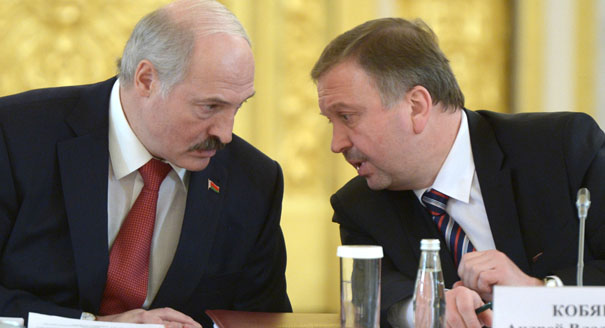Since taking office in 1994, Belarusian President Alexander Lukashenko has asked one thing of his subordinates: loyalty. As a result, the Belarusian bureaucracy is a cast of former political bosses, Soviet ideologues, and opportunists. Not wanting to be branded as liberals, these loyal public servants express excessively reactionist views only as a means of giving Lukashenko the opportunity to play the role of the wise leader who dispatches his underlings’ “radical” ideas.
Recently, however, a new trend has begun to sweep through Belarusian politics: the government’s economic institutions are filling up with pro-market bureaucrats who oppose Lukashenko’s socialist political philosophy.
The first sign of change came in 2012, when Lukashenko replaced Sergey Tkachev, his Marxist economic advisor, with aging banker Petr Prokopovich. Then, in 2013, Prokopovich was replaced by Kirill Rudy, a thirty-five-year-old professor and former Fulbright scholar who is avowedly pro-market.
Rudy took over at a difficult time. In 2009, Belarus began to experience a series of significant financial and economic crises. In 2014, the Belarusian ruble lost 30 percent of its value in thirty days. During this crisis period, all important economic positions in the Council of Ministers—the seat of executive power—were given to pro-market bureaucrats some with the private sector background.
Under new leadership, the National Bank was able to stabilize the exchange rate by implementing tight monetary policies and introducing a floating rate for the Belarusian ruble for the first time in years. The National Bank executives had regular meetings with independent experts, while the government raised the retirement age, and increased tariffs on municipal services (so suddenly at first that Lukashenko had to dial them back). Most impressively, it fought off lobbyists who wanted a bureaucratic wage increase.
Over the last year, members of the Council of Ministers and their colleagues from the presidential administration have been pushing Lukashenko to begin enacting broader governmental reform. They aim to weaken governmental support for ineffective semi-state companies and to begin to move toward privatization.
Rudy has been particularly forceful in his calls for change: he has published essays and books on reform, and even lightly criticized the Belarusian economic system on national television.
Not that the reformists have gone unchallenged. On recent state broadcasts, Lukashenko was seen arguing with members of his own administration. The president berated his sheepish ministers, asking, “What did you bring me this time?” and insisting he would never agree to their proposed reforms. In late June, Lukashenko complained that certain members of his government “want to take some radical steps.”
Even though he refuses to listen, the fact that Lukashenko and his administration have even slightly divergent views is a new phenomenon: Belarus is an authoritarian country with a rigid top-down power structure, and Lukashenko is a committed socialist. He makes economic decisions not based on what the market needs but on how he’s feeling that day and is personally responsible for holding up reform.
Why, then, has he stocked his cabinet with progressive professionals?
To a certain extent, a failing economy has forced his hand: for the past several years, low gold reserves, growing external bond debt, double-digit inflation, a trade imbalance, overdependence on Russia, and periodic crashes of the Belarusian ruble have plagued the economy. At a certain point, Lukashenko could no longer afford to take advice from Marxist professors at public universities. He needed a team of experienced technocrats, people who would be able to speak the same language as the IMF.
And it’s not just the administration’s economists who are increasingly reform-minded. The Belarusian Ministry of Foreign Affairs, headed by Vladimir Makei, holds similarly liberal views. Like Makei, Belarusian diplomats tend to be pragmatic types who argue the country should be a more neutral regional actor, reducing its dependence on Russia and becoming more connected to Europe.
Still, Belarus isn’t beelining toward reform. Kirill Rudy is leaving his post, having been recently appointed as ambassador to China. Some speculate that he pushed too hard for reform, while others think he may have asked for the transfer himself.
Even the “liberals” in the Belarusian elite remain completely loyal to the president and refuse to take political action without his blessing. They’re trying to fix the system from within, searching for the right arguments to convince Lukashenko that reform is necessary. They want the shift to a market-based economy to happen slowly.
Indeed, one should not exaggerate just how much friction there is in the Belarusian establishment. The autocracy is even more firmly entrenched in Belarus than in many Central Asian states. For now, both the reformers and their opponents are fighting for the right to whisper in Lukashenko’s ear.
The reformers’ progressive agenda has some influential opponents; it isn’t only Lukashenko who benefits from government control over the economy. State industry bosses and local elites don’t like the possibility of change and have long criticized the “romantics in the administration.” Security officials are also wary of liberalization efforts, worried that they will lose some of their power. By and large, however, these factions are only worried about unbridled privatization, as they certainly wouldn’t mind getting their hands on some state property.
Two key factors suggest that the reformers may prevail in the medium term. The first is Belarus’s failing economy. Both the public and the government are keenly aware that the resources necessary to maintain the status quo have dried up. Second, progressives in the government are far younger than their opponents (and the sixty-one-year-old Lukashenko). At the very least, the cracks in the old power structure are coming into view.
